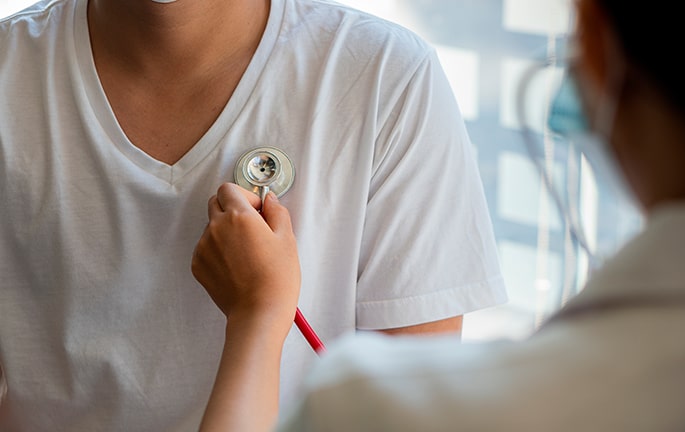Medical Checkup
Medical checkups are a fundamental part of preventive medicine. Through health exams, early diagnosis of chronic diseases or serious conditions can be made, helping to maintain the patient's overall well-being. Let us explain what a medical checkup entails. Book an appointment at one of our hospitals.

What is the Medical Checkup Unit?
Preventive medicine is the cornerstone of good health. Through routine medical checkups, diseases can be detected in their early stages, allowing treatment to begin as soon as possible to increase recovery chances. Furthermore, medical checkups encourage healthy lifestyle habits and help patients feel better.
One of the most important aspects of regular medical exams is that they should be tailored to the individual based on age, sex, and previous health conditions.
What Does the Medical Checkup Unit Study?
At the Medical Checkup Unit, specialists focus on people's health care, prevention, and promoting a healthy lifestyle. To make medical checkups truly effective, they need to be as personalized as possible. Therefore, Quirónsalud offers a series of specific exams, among which the following stand out:
- Sports Medical Checkup: designed for individuals with high levels of physical activity. It includes nutritional and cineanthropometric studies to assess the suitability of the exercise.
- Complete Cardiological Checkup: targeted at patients with cardiovascular risk, evaluating the condition of heart valves and detecting arterial calcifications.
- Urological Exam: aimed at detecting oncological or vascular conditions specific to the male sex.
- Gynecological Exam: designed to evaluate the overall health of the reproductive system and prevent diseases related to the female reproductive organs.
- Auditory Exam: focused on specific tests for those experiencing hearing loss or suffering from vertigo.
- Ophthalmological Exam: recommended for individuals with vision problems or a history of glaucoma, hypertension, or diabetes.
Who is the Medical Checkup Unit For?
Medical checkups are one of the main pillars of preventive medicine and are carried out for individuals of any age and gender who appear to be in good health. When symptoms of an ailment appear or risk factors are present, more comprehensive and frequent medical reviews are conducted.
Diagnostic Techniques, Procedures, and Methods
Medical history, observation, and specific tests—which are becoming more precise and allow for quicker, more reliable results—form the foundation of medical exams. The procedures used in this unit are primarily diagnostic, as in most cases the results confirm the patient's good health, and no treatment is necessary. Some of the common techniques in checkups are:
- Blood and Urine Analysis: evaluate the proper functioning of the body’s organs and detect abnormalities in the components and characteristics of these fluids.
- Electrocardiogram: records the heart’s electrical signals to determine if there are any irregularities in the heartbeats.
- Abdominal Ultrasound: allows observation of the liver, pancreas, spleen, kidneys, bladder, and gallbladder, as well as the uterus and ovaries in women and the prostate in men.
- Spirometry: tests lung capacity and evaluates the rate and flow of air within the lungs.
- Blood Pressure Measurement: used to detect hypertension early.
- Anthropometry: records weight, height, and waist measurement to determine body mass index and cardiovascular disease risk.
Diseases and symptoms
Common Pathologies and Diseases
Some diseases commonly detected during a medical checkup include:
- Anemia
- Diabetes
- Anorexia
- Hypertension
- Vertigo
- StrokeStrokeStroke
- Hypercholesterolemia
- Infectious diseases
- Heart diseaseHeart DiseaseHeart Disease
- Kidney disease
- Thyroid disorders
- Tumor pathology
Related Symptoms
Medical checkups are not always associated with specific symptoms, as they are recommended for seemingly healthy individuals. However, the aforementioned pathologies often present symptoms such as:
About the Medical Checkup Consultation
We solve any doubts you may have before you see the specialist
Healthy adults who are not showing symptoms of any disease should undergo a full checkup every two years. However, starting at age 40, it is recommended to have them annually, as these reviews help to rule out or detect diseases in their early stages and contribute to adopting healthy lifestyle habits.
What Should You Keep in Mind?
When attending a consultation for a checkup, the doctor starts with an interview, conducting a medical history and performing a physical examination to check reflexes, bone condition, and muscle tension. Then, routine tests are performed to gain a deeper understanding of the patient's health.
Depending on the individual’s characteristics and lifestyle, as well as the results of the initial exams, additional tests may be requested.
It is important to note that fasting is required for blood and urine sample collection.
What Should You Bring to the Consultation?
To facilitate the process, it is recommended to wear comfortable clothing that can be easily removed. Additionally, it helps to bring a list of significant medical history, past illnesses, and any current medications being taken.

If you have any further questions, please contact us through the Patient Services telephone number: 900 301 013

























